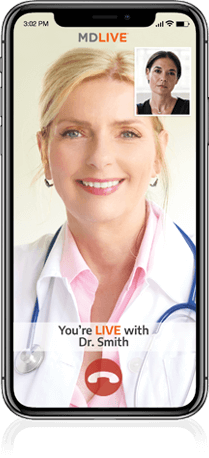It is estimated that over 3.7 billion people under 50 (67% of the world’s population) are infected with the virus that typically causes cold sores.1 Cold sores – also called “fever blisters” – are tiny, painful sores that occur most often in the mouth and nose area, and they are one of the most common conditions treated by MDLIVE doctors every year.
- 1https://www.who.int/news-room/detail/28-10-2015-globally-an-estimated-two-thirds-of-the-population-under-50-are-infected-with-herpes-simplex-virus-type-1
Get the facts on cold sores.
We turned to Dr. Vontrelle Roundtree, MDLIVE Interim Chief Medical Officer, for more details on the causes of cold sores, the symptoms, how they can be treated, and what to avoid when you have them.
What causes cold sores?
Cold sores are caused by the herpes simplex virus (HSV-1 and HSV-2), which can lie dormant in your skin’s nerve cells for years before a cold sore appears. You can contract the HSV virus through close contact or sharing anything (i.e., eating utensils, towels, drinking glasses) with someone who has the virus.
Once you have the virus in your body, cold sores can be triggered by many factors, including:
- Windy, cold weather
-
Sun exposure
-
Damaged, dry, or cracked lips
-
Hormone fluctuations
-
Fever, illness, or infection
-
A weakened immune system
-
Food allergies
-
Acidic foods, like oranges, lemons, and tomatoes
Common symptoms of a cold sore include:
Cold sores usually appear on or inside your mouth and typically go through several stages – starting with tingling, itching, or burning around the lips, progressing to small, pus-filled blisters, and finally oozing and crusting over of the sore.
Other symptoms, which are more prominent with first-time outbreaks, can include:
Since the herpes virus remains in your body indefinitely, you may experience recurrences, which tend to occur at the same place and are typically less severe than the previous occurrence.
Dr. Roundtree’s perspective
“The herpes simplex virus stays in your body forever, which means there is no ‘cure’ for cold sores. Most cold sores heal and go away on their own, but you should consult an MDLIVE doctor if you want help easing symptoms or are experiencing cold sores that:
- Cause severe pain
- Recur often
- Are irritating your eyes
- Have spread to other parts of your body
- Don’t heal within two weeks
What treatments are available for cold sores?
What not to do:3
Just like Mom always said – “Don’t pick at it!” Here are some things you should avoid when you have a cold sore:
- Don’t touch it – remember, a cold sore is a highly-contagious virus, so it can spread quickly and easily from your hands to other people and other parts of your body.
- Don’t try to pop it – that just opens the sore and spreads viral fluid.
- Don’t scrub it – that won’t reduce the contagiousness or speed healing, but it might damage or irritate the surrounding skin.
- Don’t touch your eyes – without washing your hands, spreading the virus to your eyes can result in vision loss.
- Don’t pick at the scab – you might leave a scar. The scab will only last for a few days and then go away.
- Don’t eat acidic foods – things like citrus and tomatoes can burn if they come in contact with a cold sore.
- Don’t share utensils, cups, or kisses – cold sores are spread very easily, even with a peck on the cheek.
- 3https://www.healthline.com/health/how-to-get-rid-of-a-cold-sore-fast#what-not-to-do
How can MDLIVE help?
MDLIVE board-certified doctors can help you feel better sooner. MDLIVE is a fast, affordable alternative to urgent care centers, walk-in clinics, and ERs.
MDLIVE board-certified doctors care for cold sores, sore throats, colds, flu, and more than 80 common, non-emergency conditions.
Dr. Roundtree’s perspective
“The most important thing to remember is how contagious cold sores are. Strict handwashing and avoiding physical contact with others are crucial to preventing the spread of the virus. If you have cold sores connected to an illness – like a cold, fever, or the flu – seek care from an MDLIVE board-certified doctor. If you think your cold sores are stress-related, MDLIVE Mental Health can help you learn how to cope with stress.”




